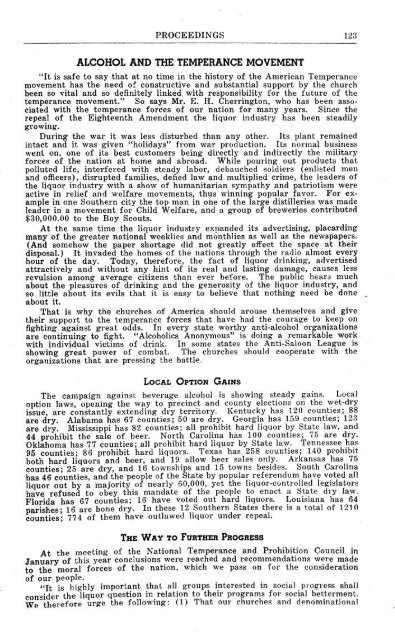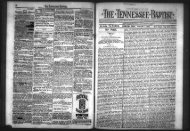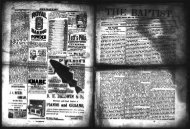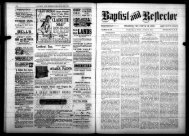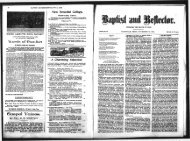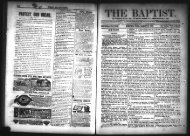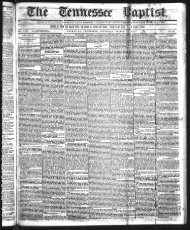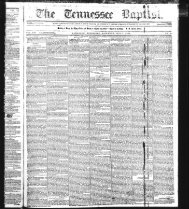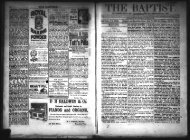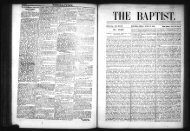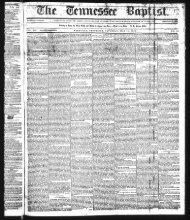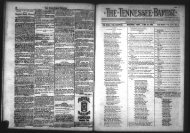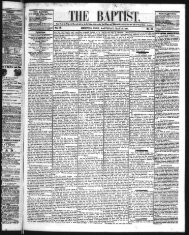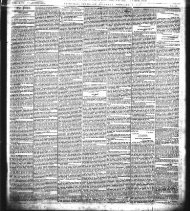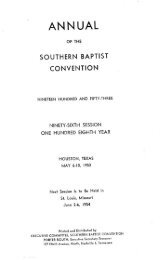- Page 1 and 2:
ANNUAL OF THE SOUTHERN BAPTIST CONV
- Page 3 and 4:
8 \ "3 4~£ OFFICERS OF THE CONVENT
- Page 5 and 6:
ANNUAL 5 RELIEF AND ANNUITY BOARD 2
- Page 7 and 8:
STATE DIRECTORS ANNUAL 7 SOUTHERN B
- Page 9 and 10:
ANNUAL i) STANDING COMMITTEES OF TH
- Page 11 and 12:
ANNUAL 11 Evangelism—A. C. Baker,
- Page 13 and 14:
ANNUAL 13 CONSTITUTION The messenge
- Page 15 and 16:
ANNUAL 15 Article XII. As to Confli
- Page 17 and 18:
ANNUAL 17 Rules governing the handl
- Page 19 and 20:
ANNUAL 19 BUSINESS AND FINANCIAL PL
- Page 21 and 22:
ANNUAL 21 contingent reserve of any
- Page 23 and 24:
PROCEEDINGS MIAMI, FLORIDA—May 15
- Page 25 and 26:
11:30 "'Widening Reach and Heighten
- Page 27 and 28:
PROCEEDINGS 27 THE SOUTHERN BAPTIST
- Page 29 and 30:
PROCEEDINGS 29 15. A resolution com
- Page 31 and 32:
PROCEEDINGS 31 interest of things t
- Page 33 and 34:
PROCEEDINGS 33 our country, and thi
- Page 35 and 36:
PROCEEDINGS 35 dence of everyone wh
- Page 37 and 38:
PROCEEDINGS Zl Educational Building
- Page 39 and 40:
PROCEEDINGS 39 agency in the midst
- Page 41 and 42:
PROCEEDINGS • 41 EXECUTIVE COMMIT
- Page 43 and 44:
July Third Quarter (1) Baptist Bibl
- Page 45 and 46:
PROCEEDINGS 2. Concerning future ne
- Page 47 and 48:
PROCEEDINGS 47 (2) 3 per cent of un
- Page 49 and 50:
PROCEEDINGS 49 CONSOLIDATED CONVENT
- Page 51 and 52:
PROCEEDINGS 51 COMPARATIVE STATEMEN
- Page 53 and 54:
PROCEEDINGS 53 Comparative Statemen
- Page 55 and 56:
PROCEEDINGS 55 Fixed Asset Funds Eq
- Page 57 and 58:
PROCEEDINGS 57 ANALYSIS OF RECEIPTS
- Page 59 and 60:
PROCEEDINGS 59 35. For the Committe
- Page 61 and 62:
PROCEEDINGS 61 The Illinois Baptist
- Page 63 and 64:
PROCEEDINGS 63 THE TASK AHEAD Vast
- Page 65 and 66:
PROCEEDINGS 65 the rule of a high m
- Page 67 and 68:
PROCEEDINGS 67 representation as co
- Page 69 and 70:
PROCEEDINGS 69 6. The compensation
- Page 71 and 72: PROCEEDINGS 71 The Committee on Boa
- Page 73 and 74: PROCEEDINGS 73 taining recommendati
- Page 75 and 76: PROCEEDINGS 75 On motion of Duke K.
- Page 77 and 78: PROCEEDINGS 77 W.M.U. WORK Mrs. Geo
- Page 79 and 80: PROCEEDINGS 79 Second Quarter—Apr
- Page 81 and 82: PROCEEDINGS 81 educational informat
- Page 83 and 84: PROCEEDINGS 83 in others during the
- Page 85 and 86: PROCEEDINGS The following consolida
- Page 87 and 88: 3 C c o U co •n en 03 «: w !M w
- Page 89 and 90: PROCEEDINGS 8 a s£ is.!-* s BOSS'S
- Page 91 and 92: PROCEEDINGS 91 AMERICAN BAPTIST THE
- Page 93 and 94: PROCEEDINGS 93 FINANCES OF COMMISSI
- Page 95 and 96: PROCEEDINGS 95 STATEMENT OF CASH RE
- Page 97 and 98: Poultry Meat '. Cattle Milk Meat :
- Page 99 and 100: PROCEEDINGS 99 Certificate in Chris
- Page 101 and 102: PROCEEDINGS 101 in the School of Re
- Page 103 and 104: PROCEEDINGS 103 life, calls to us.
- Page 105 and 106: PROCEEDINGS 105 to direct all our r
- Page 107 and 108: PROCEEDINGS 107 Gifts and grants: S
- Page 109 and 110: PROCEEDINGS 109 Cash Disbursements:
- Page 111 and 112: PROCEEDINGS 111 65. Louie D. Newton
- Page 113 and 114: COMMITTEE ON CHURCH ORGANIZATIONS P
- Page 115 and 116: PROCEEDINGS 115 Term Expiring 1948:
- Page 117 and 118: PROCEEDINGS 117 EXECUTIVE COMMITTEE
- Page 119 and 120: PROCEEDINGS 119 "2. To arrange for
- Page 121: PROCEEDINGS 121 This imperative res
- Page 125 and 126: PROCEEDINGS problem, such as radica
- Page 127 and 128: PROCEEDINGS 127 (1) that the Conven
- Page 129 and 130: PROCEEDINGS 129 is meager compared
- Page 131 and 132: PROCEEDINGS 131 April 22—Junior D
- Page 133 and 134: PROCEEDINGS 11 f. Our pastors, many
- Page 135 and 136: (7) Centennial Series PROCEEDINGS 1
- Page 137 and 138: PROCEEDINGS 137 VI. A NEW RADIO STU
- Page 139 and 140: PROCEEDINGS 139 Sunday, 25th—3:00
- Page 141 and 142: PROCEEDINGS 141 FRIDAY—Evening Se
- Page 143 and 144: PROCEEDINGS 143 J. Allen as a "comm
- Page 145 and 146: PROCEEDINGS 145 W. H. Andrew, First
- Page 149 and 150: PROCEEDINGS 147 gentle with the fir
- Page 151 and 152: PROCEEDINGS 149 any such tribute wo
- Page 153 and 154: PROCEEDINGS 151 The audience stood
- Page 155 and 156: PROCEEDINGS 153 he will never rende
- Page 157 and 158: PROCEEDINGS 155 106. The final sess
- Page 160 and 161: h h W 2 Q: ID m >• z LLI I I Q. U
- Page 162 and 163: 158 SOUTHERN BAPTIST CONVENTION wit
- Page 164 and 165: 160 SOUTHERN BAPTIST CONVENTION ALA
- Page 166 and 167: 194 NAME AND POST OFFICE CHURCH Bur
- Page 168 and 169: 196 SOUTHERN BAPTIST CONVENTION NOR
- Page 170 and 171: 198 SOUTHERN BAPTIST CONVENTION NOR
- Page 172 and 173:
200 SOUTHERN BAPTIST CONVENTION NAM
- Page 174 and 175:
202 SOUTHERN BAPTIST CONVENTION NAM
- Page 176 and 177:
204 SOUTHERN BAPTIST CONVENTION NAM
- Page 178 and 179:
206 SOUTHERN BAPTIST CONVENTION NAM
- Page 180 and 181:
208 SOUTHERN BAPTIST CONVENTION TEN
- Page 182 and 183:
210 SOUTHERN BAPTIST CONVENTION NAM
- Page 184 and 185:
212 SOUTHERN BAPTIST CONVENTION TEX
- Page 186 and 187:
214 SOUTHERN BAPTIST CONVENTION NAM
- Page 188 and 189:
216 SOUTHERN BAPTIST CONVENTION TEX
- Page 190 and 191:
215 SOUTHERN BAFIISi CONVENTION NAM
- Page 192 and 193:
220 SOUTHERN BAPTIST CONVENTION NAM
- Page 194 and 195:
222 SOUTHERN BAPTIST CONVENTION VIR
- Page 196 and 197:
224 SOUTHERN BAPTIST CONVENTION MIS
- Page 198 and 199:
226 SOUTHERN BAPTIST CONVENTION to
- Page 200 and 201:
228 SOUTHERN BAPTIST CONVENTION Dr.
- Page 202 and 203:
230 SOUTHERN BAPTIST CONVENTION For
- Page 204 and 205:
232 SOUTHERN BAPTIST CONVENTION Two
- Page 206 and 207:
234 SOUTHERN BAPTIST CONVENTION It
- Page 208 and 209:
236 SOUTHERN BAPTIST CONVENTION HOM
- Page 210 and 211:
238 SOUTHERN BAPTIST CONVENTION the
- Page 212 and 213:
240 SOUTHERN BAPTIST CONVENTION of
- Page 214 and 215:
242 SOUTHERN BAPTIST CONVENTION If
- Page 216 and 217:
244 SOUTHERN BAPTIST CONVENTION wel
- Page 218 and 219:
246 SOUTHERN BAPTIST CONVENTION cal
- Page 220 and 221:
248 SOUTHERN BAPTIST CONVENTION It
- Page 222 and 223:
250 SOUTHERN BAPTIST CONVENTION ing
- Page 224 and 225:
252 SOUTHERN BAPTIST CONVENTION of
- Page 226 and 227:
254 SOUTHERN BAPTIST CONVENTION fro
- Page 228 and 229:
286 SOUTHERN BAPTIST CONVENTION tea
- Page 230 and 231:
258 SOUTHERN BAPTIST CONVENTION LAT
- Page 232 and 233:
260 SOUTHERN BAPTIST CONVENTION suc
- Page 234 and 235:
262 SOUTHERN BAPTIST CONVENTION ter
- Page 236 and 237:
264 SOUTHERN BAPTIST CONVENTION Fed
- Page 238 and 239:
266 SOUTHERN BAPTIST CONVENTION sen
- Page 240 and 241:
268 SOUTHERN BAPTIST CONVENTION poi
- Page 242 and 243:
70 SOUTHERN BAPTIST CONVENTION Scho
- Page 244 and 245:
272 SOUTHERN BAPTIST CONVENTION Bes
- Page 246 and 247:
274 SOUTHERN BAPTIST CONVENTION att
- Page 248 and 249:
276 SOUTHERN BAPTIST CONVENTION Bas
- Page 250 and 251:
278 SOUTHERN BAPTIST CONVENTION Dur
- Page 252 and 253:
280 SOUTHERN BAPTIST CONVENTION suc
- Page 254 and 255:
282 SOUTHERN BAPTIST CONVENTION yea
- Page 256 and 257:
284 SOUTHERN BAPTIST CONVENTION loo
- Page 258 and 259:
286 SOUTHERN BAPTIST CONVENTION VIC
- Page 260 and 261:
288 SOUTHERN BAPTIST CONVENTION Hil
- Page 262 and 263:
290 SOUTHERN BAPTIST CONVENTION Thr
- Page 264 and 265:
292 SOUTHERN BAPTIST CONVENTION APP
- Page 266 and 267:
294 SOUTHERN BAPTIST CONVENTION Ram
- Page 268 and 269:
296 SOUTHERN BAPTIST CONVENTION PAL
- Page 270 and 271:
298 SOUTHERN BAPTIST CONVENTION Tea
- Page 272 and 273:
300 SOUTHERN BAPTIST CONVENTION Nam
- Page 274 and 275:
302 SOUTHERN BAPTIST CONVENTION Nam
- Page 276 and 277:
304 SOUTHERN BAPTIST CONVENTION FOR
- Page 278 and 279:
Home Mission Board ONE HUNDRED FIRS
- Page 280 and 281:
308 SOUTHERN BAPTIST CONVENTION pri
- Page 282 and 283:
£ll> SOUTHERN BAPTIST CONVENTION:
- Page 284 and 285:
312 SOUTHERN BAPTIST CONVENTION NEW
- Page 286 and 287:
314 SOUTHERN BAPTIST CONVENTION tut
- Page 288 and 289:
316 SOUTHERN BAPTIST CONVENTION SEC
- Page 290 and 291:
!18 SOUTHERN BAPTIST CONVENTION men
- Page 292 and 293:
320 SOUTHERN BAPTIST CONVENTION exc
- Page 294 and 295:
322 SOUTHERN BAPTIST CONVENTION So
- Page 296 and 297:
324 SOUTHERN BAPTIST CONVENTION tar
- Page 298 and 299:
326 SOUTHERN BAPTIST CONVENTION SEC
- Page 300 and 301:
328 SOUTHERN BAPTIST CONVENTION The
- Page 302 and 303:
330 .SOUTHERN BAPTIST CONVENTION ar
- Page 304 and 305:
332 SOUTHERN BAPTIST CONVENTION SEC
- Page 306 and 307:
334 SOUTHERN BAPTIST CONVE±>JTION
- Page 308 and 309:
336 SOUTHERN BAPTIST CONVENTION SEC
- Page 310 and 311:
338 SOUTHERN BAPTIST CONVENTION ing
- Page 312 and 313:
340 SOUTHERN BAPTIST CONVENTION KIN
- Page 314 and 315:
342 SOUTHERN BAPTIST CONVENTION The
- Page 316 and 317:
544 SOUTHERN BAPTIST CONVENTION SUM
- Page 318 and 319:
346 SOUTHERN BAPTIST CONVENTION WOR
- Page 320 and 321:
348 SOUTHERN BAPTIST CONVENTION SEC
- Page 322 and 323:
350 SOUTHERN BAPTIST CONVENTION Adm
- Page 324 and 325:
352 SOUTHERN BAPTIST CONVENTION Wha
- Page 326 and 327:
354 SOUTHERN BAPTIST CONVENTION The
- Page 328 and 329:
356 SOUTHERN BAPTIST CONVENTION The
- Page 330 and 331:
358 SOUTHERN BAPTIST CONVENTION FAC
- Page 332 and 333:
360 SOUTHERN BAPTIST CONVENTION GEN
- Page 334 and 335:
362 SOUTHERN BAPTIST CONVENTION Men
- Page 336 and 337:
364 SOUTHERN BAPTIST CONVENTION TEN
- Page 338 and 339:
366 Explanation Hotel and Camp Oper
- Page 340 and 341:
368 SOUTHERN BAPTIST CONVENTION 191
- Page 342 and 343:
370 SOUTHERN BAPTIST CONVENTION In
- Page 344 and 345:
372 SOUTHERN BAPTIST CONVENTION" Gr
- Page 346 and 347:
374 SOUTHERN BAPTIST CONVENTION MAI
- Page 348 and 349:
376 SOUTHERN BAPTIST CONVENTION gos
- Page 350 and 351:
378 SOUTHERN BAPTIST CONVENTION DEP
- Page 352 and 353:
380 SOUTHERN BAPTIST CONVENTION DEF
- Page 354 and 355:
382 SOUTHERN BAPTIST CONVENTION 5.
- Page 356 and 357:
384 l SOUTHERN BAPTIST CONVENTION A
- Page 358 and 359:
jjb6 SOUTHERN BAPTIST CONVENTION TH
- Page 360 and 361:
388 SOUTHERN BAPTIST CONVENTION tur
- Page 362 and 363:
390 SOUTHERN BAPTIST CONVENTION TEA
- Page 364 and 365:
392 SOUTHERN BAPTIST CONVENTION Chr
- Page 366 and 367:
394 SOUTHERN BAPTIST CONVENTION WHA
- Page 368 and 369:
396 SOUTHERN BAPTIST CONVENTION SER
- Page 370 and 371:
398 SOUTHERN BAPTIST CONVENTION on
- Page 372 and 373:
400 SOUTHERN BAPTIST CONVENTION ADU
- Page 374 and 375:
402 SOUTHERN BAPTIST CONVENTION We
- Page 376 and 377:
404 SOUTHERN BAPTIST CONVENTION CD
- Page 378 and 379:
406 SOUTHERN BAPTIST CONVENTION 5.
- Page 380 and 381:
408 SOUTHERN BAPTIST CONVENTION YOU
- Page 382 and 383:
410 SOUTHERN BAPTIST CONVENTION U)
- Page 384 and 385:
412 SOUTHERN BAPTIST CONVENTION THE
- Page 386 and 387:
414 SOUTHERN BAPTIST CONVENTION Cou
- Page 388 and 389:
416 SOUTHERN BAPTIST CONVENTION Nor
- Page 390 and 391:
418 SOUTHERN BAPTIST CONVENTION Vol
- Page 392 and 393:
420 SOUTHERN BAPTIST CONVENTION Fir
- Page 394 and 395:
422 SOUTHERN BAPTIST CONVENTION Mrs
- Page 396 and 397:
424 SOUTHERN BAPTIST CONVENTION Ske
- Page 398 and 399:
426 SOUTHERN BAPTIST CONVENTION CHU
- Page 400 and 401:
428 SOUTHERN BAPTIST CONVENTION VIS
- Page 402 and 403:
430 SOUTHERN BAPTIST CONVENTION col
- Page 404 and 405:
432 SOUTHERN BAPTIST CONVENTION com
- Page 406 and 407:
434 SOUTHERN BAPTIST CONVENTION Bro
- Page 408 and 409:
436 SOUTHERN BAPTIST CONVENTION CHA
- Page 410 and 411:
438 SOUTHERN BAPTIST CONVENTION Thu
- Page 412 and 413:
440 SOUTHERN BAPTIST CONVENTION Sav
- Page 414 and 415:
442 SOUTHERN BAPTIST CONVENTION In
- Page 416 and 417:
444 SOUTHERN BAPTIST CONVENTION wer
- Page 418 and 419:
446 SOUTHERN BAPTIST CONVENTION hol
- Page 420 and 421:
448 SOUTHERN BAPTIST CONVENTION ann
- Page 422 and 423:
450 SOUTHERN BAPTIST CONVENTION for
- Page 424 and 425:
452 SOUTHERN BAPTIST CONVENTION THE
- Page 426 and 427:
454 SOUTHERN BAPTIST CONVENTION EXP
- Page 428 and 429:
456 SOUTHERN BAPTIST CONVENTION INV
- Page 430 and 431:
458 SOUTHERN BAPTIST CONVENTION The
- Page 432 and 433:
460 SOUTHERN BAPTIST CONVENTION REC
- Page 434 and 435:
46*J SOUTHERN BAPTIST CONVENTION oi
- Page 436 and 437:
464 SOUTHERN BAPTIST CONVENTION 1.
- Page 438 and 439:
466 SOUTHERN BAPTIST CONVENTION (34
- Page 440 and 441:
468 SOUTHERN BAPTIST CONVENTION MEM
- Page 442 and 443:
470 SOUTHERN BAPTIST CONVENTION Yea
- Page 444 and 445:
472 SOUTHERN BAPTIST CONVENTION tha
- Page 446 and 447:
WOMAN'S MISSIONARY UNION COVERING C
- Page 448 and 449:
476 SOUTHERN BAPTIST CONVENTION tit
- Page 450 and 451:
478 SOUTHERN BAPTIST CONVENTION tio
- Page 452 and 453:
480 SOUTHERN BAPTIST CONVENTION CHU
- Page 454 and 455:
482 CALIFORNIA (Continued) Church P
- Page 456 and 457:
484 SOUTHERN BAPTIST CONVENTION NOR
- Page 458 and 459:
486 SOUTHERN BAPTIST CONVENTION TEX
- Page 460 and 461:
488 SOUTHERN BAPTIS1 CONVENTION VIR
- Page 462 and 463:
490 SOUTHERN BAPTIST CONVENTION £
- Page 464 and 465:
492 SOUTHERN BAPTIST CONVENTION is
- Page 466 and 467:
494 Baptisms 216,820 256,699 0 1944
- Page 468 and 469:
496 SOUTHERN BAPTIST CONVENTION ret
- Page 470 and 471:
498 SOUTHERN BAPTIST CONVENTION Org
- Page 472 and 473:
500 SOUTHERN BAPTIST CONVENTION Ari
- Page 474 and 475:
502 SOUTHERN BAPTIST CONVENTION Bag
- Page 476 and 477:
504 SOUTHERN BAPTIST CONVENTION Sal
- Page 478 and 479:
506 SOUTHERN BAPTIST CONVENTION Mrs
- Page 480 and 481:
508 SOUTHERN BAPTIST CONVENTION Mci
- Page 482 and 483:
510 SOUTHERN BAPTIST CONVENTION CIT
- Page 484 and 485:
512 SOUTHERN BAPTIST CONVENTION RET
- Page 486 and 487:
514 SOUTHERN BAPTIST CONVENTION Ken
- Page 488 and 489:
516 SOUTHERN BAPTIST CONVENTION sec
- Page 490 and 491:
518 SOUTHERN BAPTIST CONVENTION Rho
- Page 492 and 493:
520 SOUTHERN BAPTIST CONVJENTION RO
- Page 494 and 495:
522 SOUTHERN BAPTIST CONVENTION War
- Page 496 and 497:
524 SOUTHERN BAPTIST CONVENTION Sha
- Page 498 and 499:
526 SOUTHERN BAPTIST CONVENTION ALA
- Page 500 and 501:
528 SOUTHERN BAPTIST CONVENTION Cog
- Page 502 and 503:
530 SOUTHERN BAPTIST CONVENTION Hal
- Page 504 and 505:
532 SOUTHERN BAPTIST CONVENTION Let
- Page 506 and 507:
534 SOUTHERN BAPTIST CONVENTION Pow
- Page 508 and 509:
536 SOUTHERN BAPTIST CONVENTION Var
- Page 510 and 511:
538 SOUTHERN BAPTIST CONVENTION Bar
- Page 512 and 513:
540 SOUTHERN BAPTIST CONVENTION Hou
- Page 514 and 515:
542 SOUTHERN BAPTIST CONVENTION Smi
- Page 516 and 517:
544 SOUTHERN BAPTIST CONVENTION •
- Page 518 and 519:
54C SOUTHERN BAPTIST CONVENTION Bla
- Page 520 and 521:
548 SOUTHERN BAPTIST CONVENTION Hel
- Page 522 and 523:
550 SOUTHERN BAPTIST CONVENTION Rea
- Page 524 and 525:
552 SOUTHERN BAPTIST CONVENTION All
- Page 526 and 527:
554 SOUTHERN BAPTIST CONVENTION Dea
- Page 528 and 529:
556 Jones, Mack, Cedartown, P. Jone
- Page 530 and 531:
558 SOUTHERN BAPTIST CONVENTION Ree
- Page 532 and 533:
560 SOUTHERN BAPTIST CONVENTION Wit
- Page 534 and 535:
562 SOUTHERN BAPTIST CONVENTION Kee
- Page 536 and 537:
564 SOUTHERN BAPTIST CONVENTION Als
- Page 538 and 539:
566 SOUTHERN BAPTIST CONVENTION Col
- Page 540 and 541:
568 SOUTHERN BAPTIST CONVENTION Gar
- Page 542 and 543:
570 SOUTHERN BAPTIST CONVENTION Joh
- Page 544 and 545:
572 SOUTHERN BAPTIST CONVENTION Mit
- Page 546 and 547:
574 SOUTHERN BAPTIST CONVENTION Rog
- Page 548 and 549:
576 SOUTHERN BAPTIST CONVENTION Vic
- Page 550 and 551:
578 SOUTHERN BAPTIST CONVENTION Cob
- Page 552 and 553:
580 SOUTHERN BAPTIST CONVENTION Mil
- Page 554 and 555:
582 SOUTHERN BAPTIST CONVENTION Bea
- Page 556 and 557:
5&4 SOUTHERN BAPTIST CONVENTION Dav
- Page 558 and 559:
586 SOUTHERN BAPTIST CONVENTION Par
- Page 560 and 561:
588 SOUTHERN BAPTIST CONVENTION Bar
- Page 562 and 563:
590 SOUTHERN BAPTIST CONVENTION Fos
- Page 564 and 565:
592 SOUTHERN BAPTIST CONVENTION McR
- Page 566 and 567:
594 SOUTHERN BAPTIST CONVENTION Sme
- Page 568 and 569:
596 SOUTHERN BAPTIST CONVENTION Fle
- Page 570 and 571:
598 SOUTHERN BAPTIST CONVENTION Bro
- Page 572 and 573:
600 Goode, W. E., Scotland Neck, P.
- Page 574 and 575:
602 Lide, Frank P., Wake Forest, P.
- Page 576 and 577:
604 SOUTHERN BAPTIST CONVENTION Ruf
- Page 578 and 579:
606 SOUTHERN BAPTIST CONVENTION Bos
- Page 580 and 581:
608 SOUTHERN BAPTIST CONVENTION Ary
- Page 582 and 583:
610 SOUTHERN BAPTIST CONVENTION Ewi
- Page 584 and 585:
612 McClain, Jos. T., Rt 2, Comanch
- Page 586 and 587:
614 SOUTHERN BAPTIST CONVENTION Spe
- Page 588 and 589:
616 Martin, W. C, R.F.D. 3, Spartan
- Page 590 and 591:
618 SOUTHERN BAPTIST CONVENTION Cok
- Page 592 and 593:
620 SOUTHERN BAPTIST CONVENTION Mar
- Page 594 and 595:
622 SOUTHERN BAPTIST CONVENTION Cat
- Page 596 and 597:
624 SOUTHERN BAPTIST CONVENTION Gri
- Page 598 and 599:
626 SOUTHERN BAPTIST CONVENTION McC
- Page 600 and 601:
628 SOUTHERN BAPTIST CONVENTION Rod
- Page 602 and 603:
630 SOUTHERN BAPTIST CONVENTION Wil
- Page 604 and 605:
632 SOUTHERN BAPTIST CONVENTION Bos
- Page 606 and 607:
634 SOUTHERN BAPTIST CONVENTION Coo
- Page 608 and 609:
636 SOUTHERN BAPTIST CONVENTION Fer
- Page 610 and 611:
638 SOUTHERN BAPTIST CONVENTION Har
- Page 612 and 613:
640 SOUTHERN BAPTIST CONVENTION Kin
- Page 614 and 615:
G42 SOUTHERN BAPTIST CONVENTION Mil
- Page 616 and 617:
644 SOUTHERN BAPTIST CONVENTION Ram
- Page 618 and 619:
646 SOUTHERN BAPTIST CONVENTION Sor
- Page 620 and 621:
648 SOUTHERN BAPTIST CONVENTION Web
- Page 622 and 623:
650 SOUTHERN BAPTIST CONVENTION Cho
- Page 624 and 625:
652 SOUTHERN BAPTIST CONVENTION Lum
- Page 626 and 627:
6.14 SOUTHERN BAPTIST CONVENTION 13
- Page 628 and 629:
01 X CJ si z fa cu w e cu !2 '53 cu
- Page 630 and 631:
658 SOUTHERN BAPTIST CONVENTION PRO
- Page 632 and 633:
660 SOUTHERN BAPTIST CONVENTION 4 C
- Page 634 and 635:
662 SOUTHERN BAPTIST CONVENTION OFF
- Page 636 and 637:
664 SOUTHERN BAPTIST CONVENTION PRO
- Page 638 and 639:
G66 SOUTHERN BAPTIST CONVENTION 10
- Page 640 and 641:
668 SOUTHERN BAPTIST CONVENTION {>>
- Page 642 and 643:
670 SOUTHERN BAPTIST CONVENTION 14
- Page 644 and 645:
672 SOUTHERN BAPTIST CONVENTION 16
- Page 646 and 647:
674 SOUTHERN BAPTIST CONVENTION 18
- Page 648 and 649:
676 SOUTHERN BAPTIST CONVENTION 20
- Page 650 and 651:
678 SOUTHERN BAPTIST CONVENTION CHO
- Page 652 and 653:
680 SOUTHERN BAPTIST CONVENTION THE
- Page 654 and 655:
682 SOUTHERN BAPTIST CONVENTION Dr.
- Page 656 and 657:
684 SOUTHERN BAPTIST CONVENTION Cho
- Page 658 and 659:
686 SOUTHERN BAPTIST CONVENTION Now
- Page 660 and 661:
INDEX Academies - 88, 89 Addresses:


